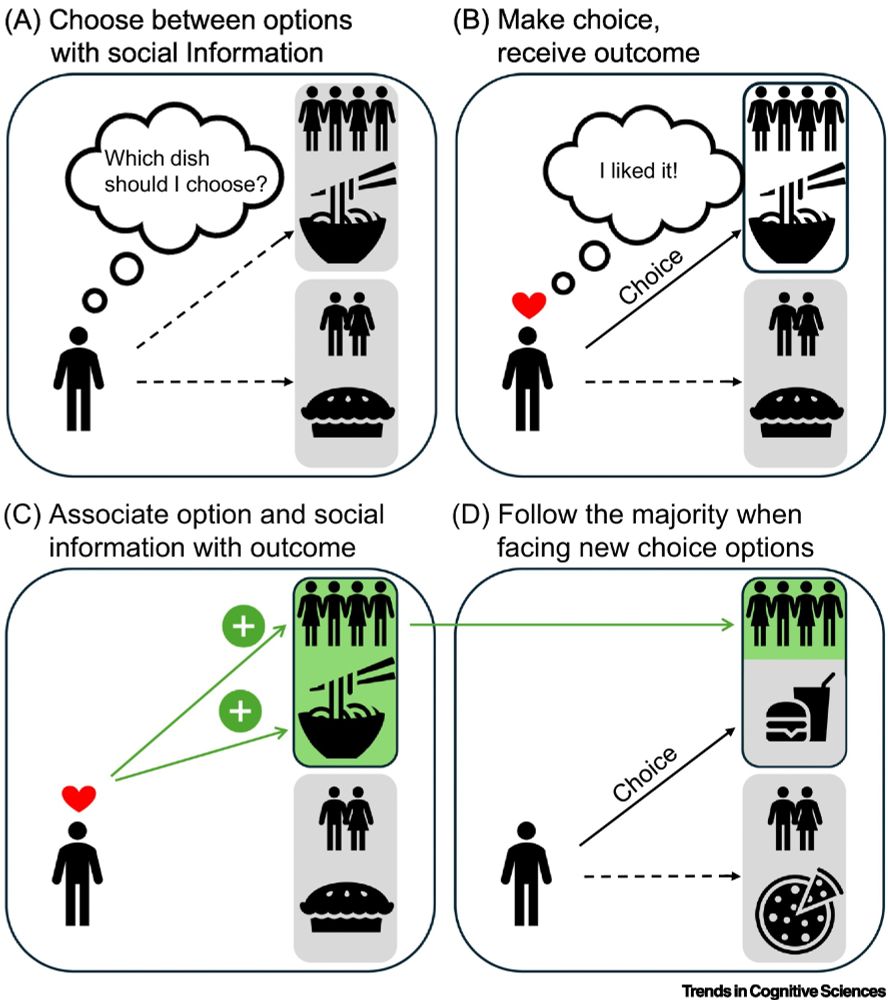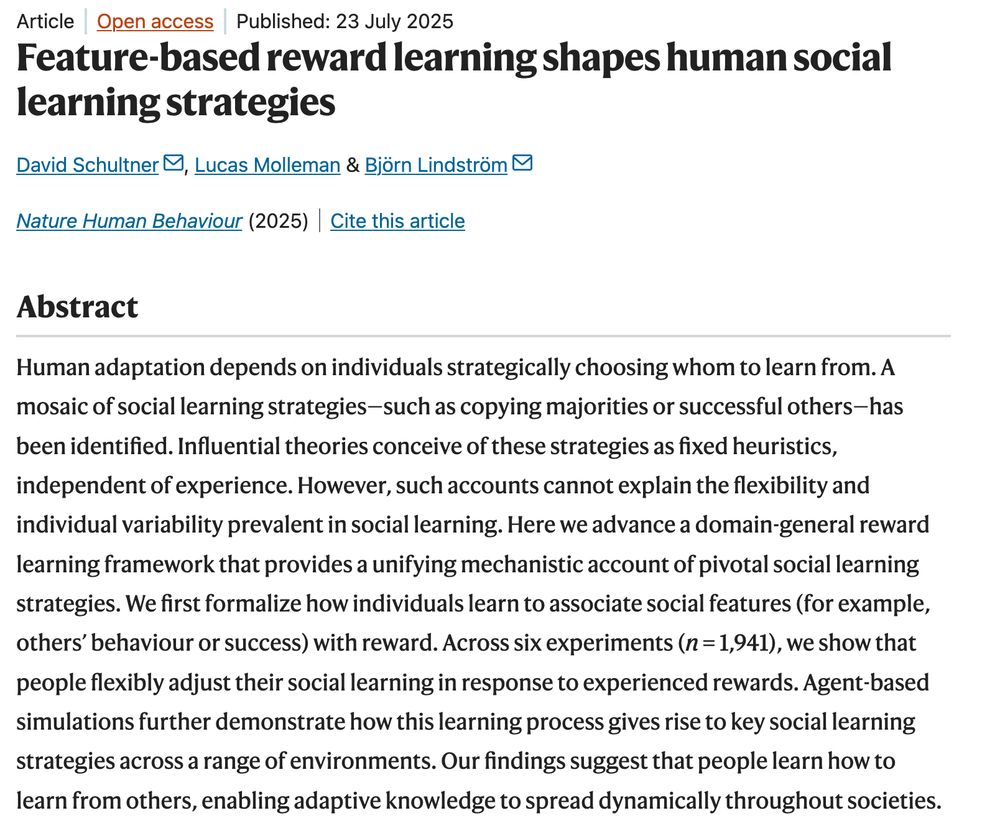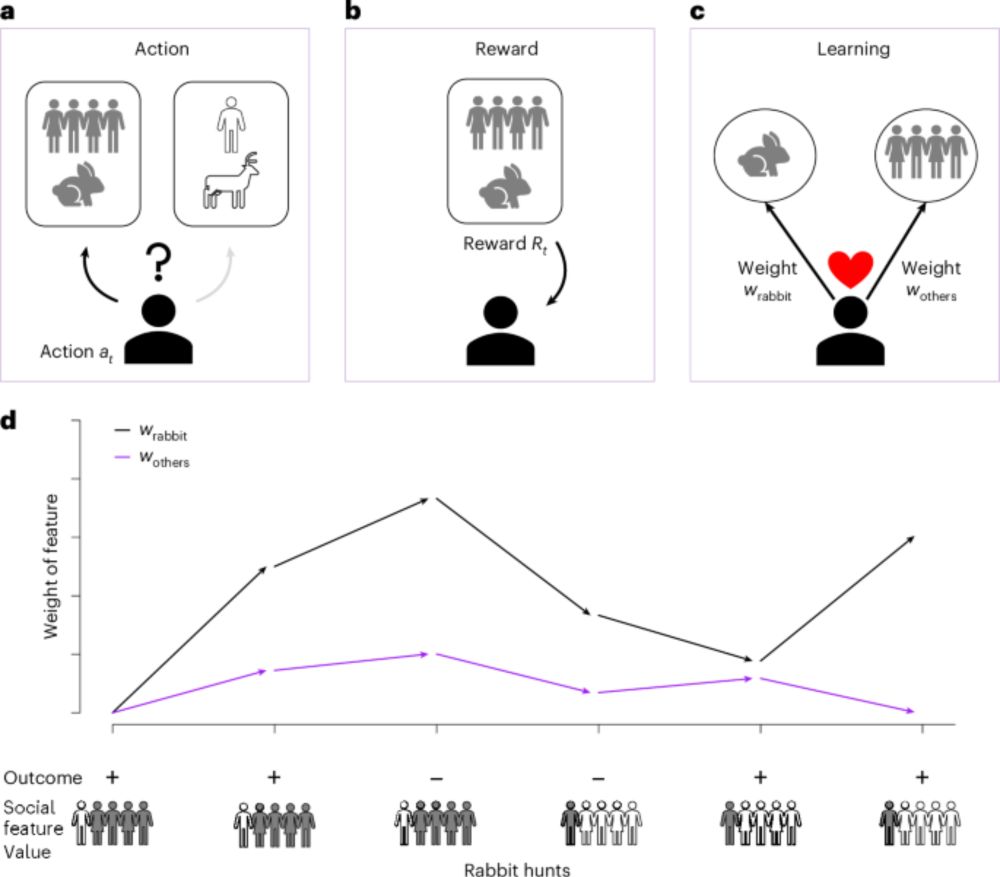Very grateful that our paper was awarded ISCON’s Best 2024 Paper in Social Cognition!! Huge thanks to the fantastic team: Ben Stillerman, @bjornlindstrom.bsky.social , @leorhackel.bsky.social , Damaris Hagen, Nils Jostmann, and @davidamodio.bsky.social 🎊💐
02.12.2025 22:20 —
👍 24
🔁 4
💬 1
📌 0

I am pleased to announce that @davidschultner.bsky.social will be our next guest as part of the SoCR Lab's Invited Talk Series. Dr. Schultner will present recent work that offers evidence for a parsimonious and mechanistic explanation of human social learning strategies via reward learning!
05.11.2025 15:42 —
👍 8
🔁 2
💬 1
📌 1

How do humans keep inventing tools and technologies that no single person could create alone?
Our new preprint, led by
@anilyaman.bsky.social & @ts-brain.bsky.social
shows that semantic knowledge guides innovation and drives cultural evolution. 🧠📘 arxiv.org/abs/2510.12837
16.10.2025 13:48 —
👍 102
🔁 36
💬 1
📌 0
Many thanks to the editor and reviewers! 🌷
28.07.2025 08:24 —
👍 2
🔁 0
💬 0
📌 0

🎊 New paper out! In this @cp-trendscognsci.bsky.social Forum, we (with @lucasmolleman.bsky.social and @bjornlindstrom.bsky.social) summarize how reward learning can lead to adaptive social learning. We also explore the broader consequences for cultural evolution:
www.cell.com/trends/cogni... 🚄
28.07.2025 08:24 —
👍 24
🔁 7
💬 2
📌 1
Many thanks to @bjornlindstrom.bsky.social & @lucasmolleman.bsky.social
23.07.2025 14:12 —
👍 3
🔁 0
💬 0
📌 0
Altogether, we present a mechanistic account for the substantial flexibility and individual variability observed in social learning. A domain-general reward learning model shows that personal experience can shape social learning to render it adaptive.
Thanks to the reviewers and editorial team! 💐
23.07.2025 14:10 —
👍 4
🔁 0
💬 1
📌 0

Going beyond these experiments, we explore the implications of the SFL model for social learning under a variety of environmental contexts (such as spatial & environmental variability or dangerous environments, check out the full paper for these agent-based simulations and much much more).
23.07.2025 14:10 —
👍 3
🔁 0
💬 1
📌 0

In a final experiment (Exp. 6), we find evidence suggesting that learning about social- and non-social features follows the same principles. We do so by establishing feature competition (i.e., shared associative strength between social- and non-social features, see full text for details).
23.07.2025 14:10 —
👍 2
🔁 0
💬 1
📌 0

This suggests that SLS can be shaped by rewards. We show that among multiple available features, people pick out reward-predictive ones (Exp. 3), that this learning pattern also holds with 4 (instead of 2) choice options (Exp. 4), and that learning generalizes to dissimilar contexts (Exp. 5)
23.07.2025 14:10 —
👍 2
🔁 0
💬 1
📌 0

Exps. 1 & 2: Consistent with our model, social learning was shaped by rewards: Having learnt that the majority (or minority) choice is reward predictive, pps copied the majority (or minority) when encountering novel targets. Exp. 2 replicates this with others' payoffs instead of choice behaviour.
23.07.2025 14:10 —
👍 1
🔁 0
💬 1
📌 0

☀️ We advance a domain-general reinforcement learning model—the Social Feature Learning (SFL) model—explaining SLS as the result of associating social features (e.g., others choices, their payoffs, or their age) with rewards. We test core assumptions and predictions across 6 experiments (n = 1941).
23.07.2025 14:10 —
👍 3
🔁 0
💬 1
📌 0
Selective social learning is essential to navigate the vast and often contradictory forest of social information. At least 26 social learning strategies (SLS; such as 'follow the majority'; 'copy the prestigious') have been documented, but which mechanisms underlie the emergence of SLS? 🤔
23.07.2025 14:10 —
👍 2
🔁 0
💬 1
📌 0

💥 Our new paper (with @lucasmolleman.bsky.social and @bjornlindstrom.bsky.social) is now out in @nathumbehav.nature.com 🥳 www.nature.com/articles/s41...
🧠 Here, we advance a novel RL account—the Social Feature Learning (SFL) model—that explains how people learn to learn from others! 🤝
🧵👇
23.07.2025 14:10 —
👍 30
🔁 9
💬 1
📌 1
Join our team as a Postdoc! 💐
08.04.2025 07:01 —
👍 2
🔁 0
💬 0
📌 0
with @philipparnamets.bsky.social
14.03.2025 13:02 —
👍 0
🔁 0
💬 0
📌 0
Thanks to my great team!
w/ Philip Pärnamets, Ekatarina Yarmolenko & @bjornlindstrom.bsky.social
11.03.2025 10:15 —
👍 1
🔁 0
💬 2
📌 0
Together, these findings show that fairness concerns & conformity jointly but independently shape moral norms. Understanding their interplay can help explain the successes & failures of third-party judgments regulating prosociality in social systems
11.03.2025 10:15 —
👍 1
🔁 0
💬 1
📌 0

Having established these two separable factors, how may their interplay affect larger social systems? Using agent-based simulations, we find:
🔹 Inequality aversion helped societies move toward prosocial states (blue)
🔹 Commonness bias reinforced selfish defaults (red) instead of promoting fairness
11.03.2025 10:15 —
👍 3
🔁 0
💬 1
📌 0

How do both factors interact in a shared setting? In Study 2, we combined both Study 1 games into a novel game, manipulating inequality & commonness independently. Results closely track those of Study 1: Both motivations shaped moral judgments, but were only weakly related.
11.03.2025 10:15 —
👍 2
🔁 0
💬 1
📌 0

In Study 1, participants judged others’ behavior in economic games designed to isolate each motivation. Results show distinct effects of inequality aversion & commonness, however: only weak associations between both factors emerged, pointing to separate cognitive contributions
11.03.2025 10:15 —
👍 1
🔁 0
💬 1
📌 0
Third-party judgments help regulate social life—as in cooperation & coordination problems—but which principles guide them?
Past research has employed monocausal approaches, focused on 1) inequality aversion or 2) the common-is-moral heuristic, neglecting the complex nature of many moral judgments
11.03.2025 10:15 —
👍 1
🔁 0
💬 1
📌 0
OSF
🚨 New preprint out! 🚨
How do people make moral judgments as third parties? 👀 We show how two motivations—inequality aversion (fair = moral) ⚖️ and the common-is-moral heuristic (frequent = moral 👨👩👧👧—interact to shape evaluations 🧵👇
📄 osf.io/preprints/ps...
11.03.2025 10:15 —
👍 25
🔁 8
💬 2
📌 2
Thanks to my great team!
w/ Philip Pärnamets, Ekatarina Yarmolenko & @bjornlindstrom.bsky.social
11.03.2025 10:07 —
👍 0
🔁 0
💬 0
📌 0
Together, these findings show that fairness concerns & conformity jointly 🤝 but independently ◀️▶️ shape moral evaluations. Understanding their interplay can help explain the successes & failures of third-party judgments regulating prosociality in social systems.
11.03.2025 10:07 —
👍 0
🔁 0
💬 1
📌 0

Having established separable factors, we asked: how may their interplay affect larger social systems? 🤔 Using agent-based simulations, we found:
🔹Inequality aversion helped societies move toward prosocial states (blue)
🔹Commonness bias reinforced selfish defaults (red) instead of promoting fairness
11.03.2025 10:07 —
👍 0
🔁 0
💬 1
📌 0

How do both factors interact in a shared setting? In Study 2, we combined both Study 1 games into a novel game, manipulating inequality & commonness independently. Results closely mirrored those of Study 1: Both motivations shaped moral judgments, but were only weakly related.
11.03.2025 10:07 —
👍 0
🔁 0
💬 1
📌 0

In Study 1, participants judged others’ behavior in economic games designed to isolate each motivation. Results show distinct effects of inequality aversion & commonness, however: only weak associations between both factors emerged, pointing to separate cognitive contributions.
11.03.2025 10:07 —
👍 0
🔁 0
💬 1
📌 0















